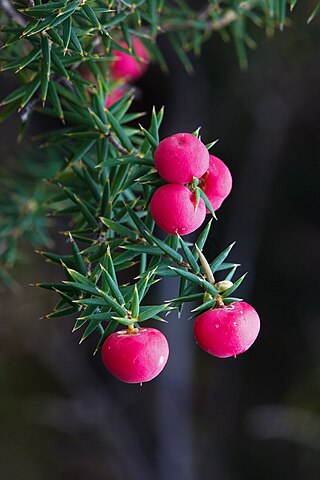
The Ericaceae are a family of flowering plants, commonly known as the heath or heather family, found most commonly in acidic and infertile growing conditions. The family is large, with c. 4250 known species spread across 124 genera, making it the 14th most species-rich family of flowering plants. The many well known and economically important members of the Ericaceae include the cranberry, blueberry, huckleberry, rhododendron, and various common heaths and heathers.

Royal Botanic Gardens, Kew is a non-departmental public body in the United Kingdom sponsored by the Department for Environment, Food and Rural Affairs. An internationally important botanical research and education institution, it employs 1,100 staff. Its board of trustees is chaired by Dame Amelia Fawcett.
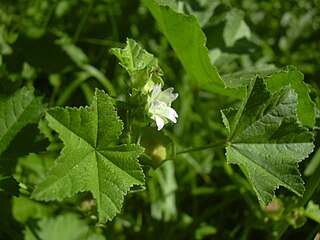
Malvaceae, or the mallows, is a family of flowering plants estimated to contain 244 genera with 4225 known species. Well-known members of economic importance include okra, cotton, cacao, roselle and durian. There are also some genera containing familiar ornamentals, such as Alcea (hollyhock), Malva (mallow), and Tilia. The genera with the largest numbers of species include Hibiscus, Pavonia, Sida, Ayenia, Dombeya, and Sterculia.

Ranunculus is a large genus of about 1700 to more than 1800 species of flowering plants in the family Ranunculaceae. Members of the genus are known as buttercups, spearworts and water crowfoots.
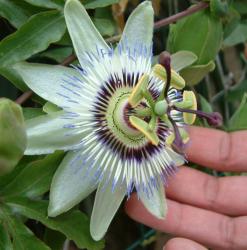
The Passifloraceae are a family of flowering plants, containing about 750 species classified in around 27 genera.

The curry tree or Bergera koenigii, is a tropical and sub-tropical tree in the family Rutaceae, native to Asia. The plant is also sometimes called sweet neem, though M. koenigii is in a different family to neem, Azadirachta indica, which is in the related family Meliaceae.

Nathaniel Lord Britton was an American botanist and taxonomist who co-founded the New York Botanical Garden in the Bronx, New York.
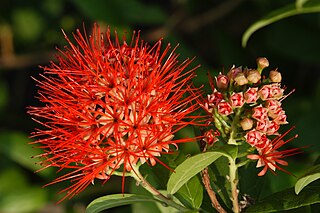
The Combretaceae, often called the white mangrove family, are a family of flowering plants in the order Myrtales. The family includes about 530 species of trees, shrubs, and lianas in ca 10 genera. The family includes the leadwood tree, Combretum imberbe. Three genera, Conocarpus, Laguncularia, and Lumnitzera, grow in mangrove habitats (mangals). The Combretaceae are widespread in the subtropics and tropics. Some members of this family produce useful construction timber, such as idigbo from Terminalia ivorensis. The commonly cultivated Quisqualis indica is now placed in the genus Combretum. Many plants in the former Quisqualis genus contain the excitotoxin quisqualic acid, a potent AMPA agonist.

The Loganiaceae are a family of flowering plants classified in order Gentianales. The family includes up to 13 genera, distributed around the world's tropics. There are not any great morphological characteristics to distinguish these taxa from others in the order Gentianales.
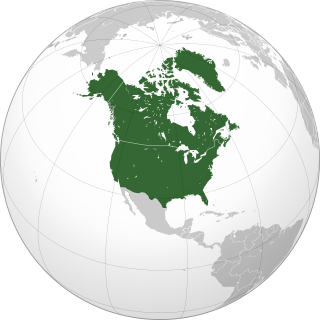
Northern America is the northernmost subregion of North America as well as the northernmost region in the Americas. The boundaries may be drawn slightly differently. In one definition, it lies directly north of Middle America. Northern America's land frontier with the rest of North America then coincides with the Mexico–United States border. Geopolitically, according to the United Nations' scheme of geographical regions and subregions, Northern America consists of Bermuda, Canada, Greenland, Saint Pierre and Miquelon and the United States.

Nyctaginaceae, the four o'clock family, is a family of around 33 genera and 290 species of flowering plants, widely distributed in tropical and subtropical regions, with a few representatives in temperate regions. The family has a distinctive fruit type called an accessory fruit or anthocarp, and many genera have extremely large pollen grains.

Elmer Drew "E. D." Merrill was an American botanist and taxonomist. He spent more than twenty years in the Philippines where he became a recognized authority on the flora of the Asia-Pacific region. Through the course of his career he authored nearly 500 publications, described approximately 3,000 new plant species, and amassed over one million herbarium specimens. In addition to his scientific work he was an accomplished administrator, college dean, university professor and editor of scientific journals.

Goodenia is a genus of about two hundred species of flowering plants in the family Goodeniaceae. Plants in this genus are herbs or shrubs, mostly endemic to Australia. The leaves are variably-shaped, the flowers arranged in small groups, with three or five sepals, the corolla bilaterally symmetrical and either fan-shaped with two "lips" or tube-shaped. The petals are usually yellow to white, the stamens free from each other and the fruit a capsule.

I. M. Johnston, was a United States botanist. He studied at Pomona College in Claremont, California and at Harvard University. His plant collections are housed in the Rancho Santa Ana Botanic Garden, in Claremont, and also in the Gray Herbarium of Harvard University.

Paul Carpenter Standley was an American botanist known for his work on neotropical plants.
The Plant List was a list of botanical names of species of plants created by the Royal Botanic Gardens, Kew and the Missouri Botanical Garden and launched in 2010. It was intended to be a comprehensive record of all known names of plant species over time, and was produced in response to Target 1 of the 2002–2010 Global Strategy for Plant Conservation, to produce "An online flora of all known plants". It has not been updated since 2013, and has been superseded by World Flora Online.
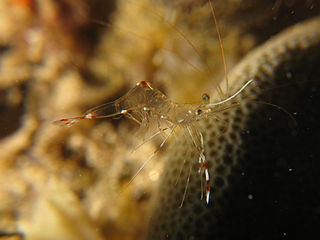
Urocaridella is a genus of shrimps comprising the following species:
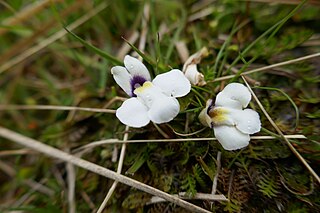
Mazaceae is a family of plants in the order Lamiales. The family was described by James L. Reveal in 2011. Genera in this family were most recently previously included in Phrymaceae and in older classifications were placed in Scrophulariaceae.
Plants of the World Online (POWO) is an online database published by the Royal Botanic Gardens, Kew. It was launched in March 2017 with the ultimate aim being "to enable users to access information on all the world's known seed-bearing plants by 2020". The initial focus was on tropical African Floras, particularly Flora Zambesiaca, Flora of West Tropical Africa and Flora of Tropical East Africa.

World Flora Online is an Internet-based compendium of the world's plant species.


















